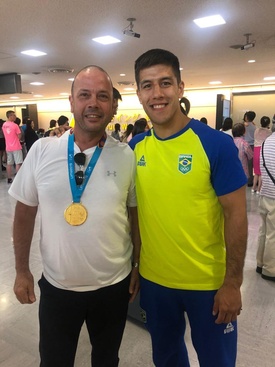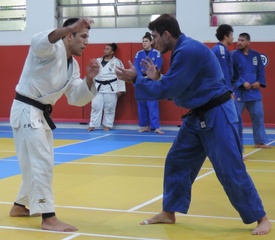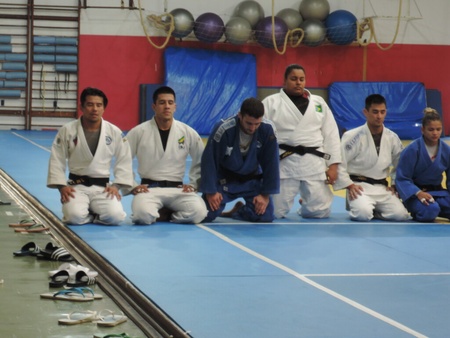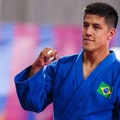Hitting the wall of nationality and heading to an "unfamiliar homeland"
After graduating from high school, he entered the International Budo University. During his first year, he won second place in the Kanto Student Tournament. He was originally supposed to be able to participate in the All Japan Junior Tournament of the Kodokan Cup, a gateway to international competitions, but was stripped of his right to participate because he was a Brazilian.
"Both my parents have Brazilian nationality, so I also have Brazilian nationality. You can choose your nationality when you turn 20, but as I was only 19 at the time, I didn't have the choice and automatically lost my right to compete in the Kodokan Cup. At the time, it was a shock, but I thought it couldn't be helped. The issue of my nationality also made me worried about my future. In Japan, many people who do judo become public servants such as teachers or police officers after retiring, but if you have Brazilian nationality, you can't become a public servant, so I was worried and my future was bleak," he said, talking about the barrier he faced due to his nationality.
The reason why Yuji, who was troubled by the issue of his nationality, decided to move to Brazil was because he was invited to play in a match in Brazil by the Brazilian club team "Academia Mercadante," which had come to International Budo University for an exchange match.
He accepted an invitation and stayed in Brazil for a week, where he participated in a junior judo tournament and won first place.
"When a Brazilian team came to practice at my university as part of an international exchange program, I told the team that I couldn't play in official matches because of my nationality, and they invited me to try out for an official match in Brazil. I stayed in Brazil for a week and won the junior tournament. That was what made me decide, 'If I can't make it in Japan anyway, I'll take a gamble and give it a go in Brazil!' I dropped out of university and caused my parents a lot of trouble by having to pay the scholarship I had borrowed. But my parents understood that I was worried about judo and my future, so they fully supported me," he said gratefully.
Portuguese Zero
Yuji then went to Brazil again and passed the entrance exam for the prestigious Brazilian club team "Sports Club Pinheiros", which has produced many famous judo athletes. He joined the club in 2014. At the time, he could barely read or write Portuguese, so he relied heavily on his two older sisters who lived in Sao Paulo.
"I really struggled with the language. At home, my parents spoke Portuguese and I would respond in Japanese. I thought I'd be able to understand everyday conversations, but the locals spoke quickly and had a regional accent, so I really struggled with understanding and conversation. Whenever I received documents in Portuguese, I just left it all to my sister," she says bashfully.
"The most difficult thing was the messages on social media. Even when information about the meeting place for the bus to take to a game was sent in a team group message, I had no idea what it said, so I would look it up on a translation app that was less powerful than the one I use now and get lost on my way to the meeting place...It was really tough, having to concentrate on the language all the time. My teammates often made fun of me for not being able to speak typical Brazilian piadas (jokes), and it was really frustrating. But I used that frustration as motivation to study conversation, and now I can understand most words and converse. In fact, I'll even joke back at my teammates," he says with a laugh.
Hold on with one's back against the wall
In Brazil, players who belong to professional sports clubs receive a monthly salary from the club, but when they first join, the salary is low. If they perform well in tournaments, their salary increases, and if they become a member of the national team, they also receive a subsidy from the government.
He was also selected for the "Programa Atletas de Alto Rendimento (PAAR)" (High Return Athlete Development Program), a program in which the military supports athletes who are considered to have a high chance of winning medals. The program is shared among the three military services, and offers promising athletes the rank of "Sergeant," monthly pay, and allows them to use military sports facilities and medical care. Considering that he is an athlete, he is exempt from regular military training and only attends one training camp per year.
He has been a member of the club since 2014. He has achieved many impressive results, including winning the Rio Olympics test tournament in 2016, the Pan American Judo Championships in 2017, the World Military Championships in 2018, and the Pan American Games in 2019.

"In my first year with the club team, my salary was only 400 reais a month. There were no dormitories at the time, so myself and my senior colleague rented a house together, and the rent was 700 reais per person. On top of that, the cost of living in São Paulo is high and I didn't have any savings, so I asked my father to cover the rent for just one year. I promised him that if I didn't get results in a year, I would return to Japan. As a result, after a year I was able to achieve good results and I started receiving subsidies from the government in addition to a raise. Now, about six years later, I am able to become independent. It was truly a do-or-die situation," he says.
The judo coaches for the club team are Thiago Camilo and Leandro Guilleiro. Both are famous athletes and coaches who have won prizes in the Olympic Games in the past. He seems to respect both of them, saying, "I really respect them. In sports, there are times when you just get used to it and give in, but these two always think about the best way to teach, so I really learn from them."
The world rankings were decided at the 2021 World Judo Championships in Budapest, Hungary, held by the International Judo Federation (IJF) on June 13. The condition for participating in the Tokyo Olympics is to be ranked within the top 18 in the world, but it was decided that he would participate by just finishing within the top 18.
"I'm relieved that the selection matches are over and I've been selected to compete in the Olympics. I feel like I've finally reached the starting line. My goal is, of course, the gold medal. To achieve that, I want to give it my all in the competition, and show the results of my daily training. And if I win gold, I want to show everyone and talk about my experiences in Japan and Brazil so far!"
Yuji said with confidence, "There have been many times in the past when I wanted to quit. But every time that happens, I think of my parents, my sister, my family, and my high school teachers, and it gives me strength. I want to do my best at this Olympics, carrying their thoughts with me. I also want to compete in the next Paris Olympics and aim for the gold medal."
*This article is reprinted from the Nikkei Shimbun (July 7th and 8th , 2021).
© 2021 Takahiko Yodo, Nikkey Shimbun





